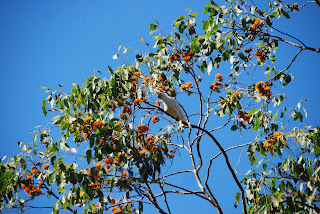Familiarity breeds contempt.
Did you learn that at school as well?
I don’t reckon it’s true. Back in
Wadeye for the third time has been wonderful.
Feeling that everything isn’t strange, understanding a bit of the
system, it’s all good. But the best is
when a local say’s “You’re back”, with a bit of a grin.
The house is familiar – the light that doesn’t come on straight
away, the louvre that doesn’t close properly and the rush to get the dishes
done before the water drains out. We had
patients to see as soon as we arrived.
On the first day, a lady rushed into my consulting room. She had a big smile, and told me about her
family. The fact that she wanted to sell
me a painting didn’t really detract. It
is good to be back.
Probably the most enthusiastic about us being here is the
Culiocoides family – better known as the midges or sandflies. They have celebrated in style...
This is a bit representative, and I'm not going to reveal all. You could make a loud sympathetic sigh at this point. But it's got me thinking. I'm more of less used to it now, and that helps me understand some issues of health care here.
I've been wondering what happens to people who live here all the time. The locals live with midges, scabies, nasty bacteria and the rest. That's life. Why would you go to the clinic with skin sores. They're a part of life that won't go away. It hasn't occurred to me to see someone about my itches. But they're not really that bad, and I have some idea of what can be done and what can't.
The hardest part of our first week is feeling that there is reasonably good provision of health care but terrible implementation. Bad skin infections have made diabetes control out of control, back aches have caused misery and poor mobility. We have cleverly given medicines and even packed them in dosette boxes. We have documented the ways we are dealing with the problems. But only to find at the end of the week that the medicines are untouched and the problems are worse.
Today I gave some antibiotics to a family member of a child who was bitten by a dog. I explained how to give them. She then asked me what they were for. I had made all sorts of assumptions. People do want to understand, and I am understanding slowly that unless I can engage at that point, there is a lot of wasted energy.
There are some good things going on here. We have heard an estimate of 650 people with jobs - not bad in a community of 3,000+. Education provision seems more flexible and relevant. There's a good feeling in town. It may be that it's bush holiday time, but I think there is more. I just wish for a health care system owned and operated by locals.

.JPG)




